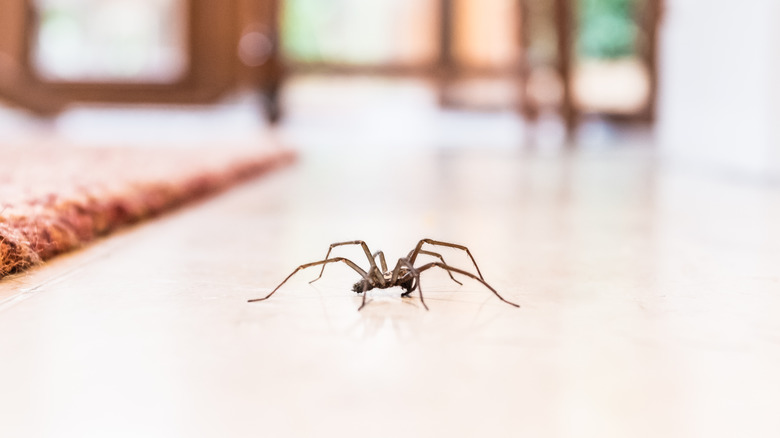Watch Your Spider Invaders Crawl Away With This Lemony Cleaning Staple
Lemon Pledge, well-known for its role in furniture maintenance, is gaining traction for its effectiveness as a spider repellent, a use far removed from its conventional purpose of cleaning, dusting, and protecting wood furniture. Some sources suggest that an application of Lemon Pledge creates a less hospitable environment for spiders, encouraging them to find other areas to inhabit. The secret behind its repellent capabilities lies in its unique formula. The taste of this household polish repels spiders, who have taste receptors on their legs, making it a surprisingly effective weapon against them.
The polish contains a blend of conditioners and protective agents, which are primarily designed to provide a glossy finish on wooden surfaces. When applied to areas frequently visited by spiders, such as window sills, corners, or secluded spots, Lemon Pledge not only maintains the wood but also forms an invisible barrier that deters spiders. The citrus scent, which spiders dislike, adds another layer of protection. Spiders prefer surfaces they can move around easily and attach their webs to, so the polish's slick surface may also be undesirable in addition to the smell. So, in essence, the combination of the scent and the polish's texture may help keep spiders at bay. While no scientific study specifically validates Lemon Pledge as a spider repellent, anecdotal evidence and understanding of spider behavior suggest that it can be a useful tool in your pest control arsenal.
Using lemon pledge to deter spiders
The application of Lemon Pledge for deterring spiders is an easy process, particularly if you're already familiar with using it as a cleaning product. Your primary target areas should be where spiders are most likely to enter and breed in your home. That being said, understanding how and why spiders enter your home is key to effectively using Lemon Pledge as a deterrent. Typically, spiders tend to lurk around windowsills, door frames, and the corners of rooms. However, they most likely come indoors through small cracks and gaps in doors, windows, or foundations. These entry points may seem insignificant, but they are sufficient for a spider. They are often seeking shelter, especially in the extreme cold of winter. Additionally, spiders are attracted to indoor environments where prey, like household pests, is abundant. This indicates that a spider problem might be a symptom of a larger pest issue.
Inside your home, spiders prefer quiet, undisturbed areas like attics, basements, and closets. These spaces provide shelter and hunting grounds for them, as these areas are likely to have other insects. So, when applying Lemon Pledge, focus on these entry and dwelling points. Remember to reapply the polish periodically, as its effectiveness can diminish over time. It's also a good idea to keep up with regular cleaning and maintenance to prevent spiders from finding comfortable hiding spots in your home.
Controlling spider infestation
While keeping them out of your house is a priority, spiders' presence in outdoor areas can be advantageous. In areas where you would prefer not to have spiders, such as inside your home, regularly applying Lemon Pledge can help. However, it's important to balance the desire to deter spiders with recognizing their benefits. Understandably, their presence in homes can be unsettling — you might have a profound fear of spiders, or you simply prefer not to share your living space with them. No doubt, preventing their infestation is a safety consideration since certain species of spiders can be harmful. Interestingly, most spiders are generally harmless and can help control pests. The spiny orb variety, for example, plays a crucial role in controlling other pests. Therefore, killing spiders shouldn't be the first line of defense.
Lastly, keep in mind that although Lemon Pledge may help maintain a spider-free home, it may be only effective for mild to moderate spider problems or as a component of a larger pest management strategy. In cases of severe spider infestation, Lemon Pledge might not be enough — you'll need a comprehensive solution with a more specialized and robust pest control method. Other reliable methods include using commercial spider repellents, sealing cracks and openings to prevent their entry, and placing glue traps strategically. For extreme cases, seeking help from a professional pest control service is often the most effective strategy. They can provide specific treatments and advice for the long-term management of spider populations.


